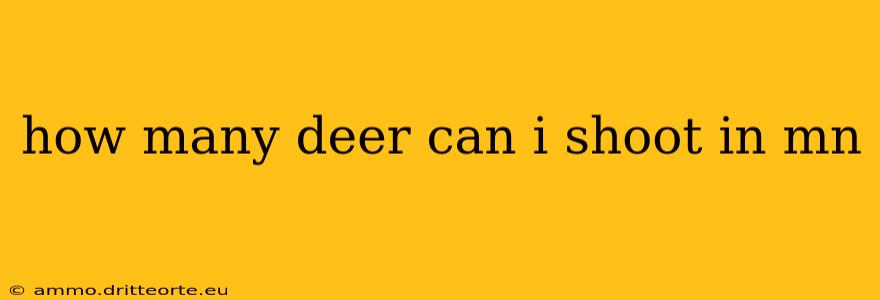Hunting deer in Minnesota is a cherished tradition for many, but understanding the regulations is crucial for a safe and legal hunt. The number of deer you can shoot—your license's bag limit—depends on several factors, and this guide will break down everything you need to know to plan your hunt legally and responsibly.
Understanding Minnesota Deer Hunting Licenses and Permits
Before discussing bag limits, it's essential to understand the different types of deer hunting licenses available in Minnesota. The number of deer you can harvest is directly tied to the license you possess. These licenses are not simply "buy and hunt" affairs; they often require additional permits or are specific to certain hunting zones.
Key License Types & Considerations:
-
Resident vs. Non-Resident: Residents of Minnesota generally have access to a wider range of licenses and more favorable bag limits than non-residents. Non-residents often face higher fees and more restrictive regulations.
-
Deer Hunting License: This is the base license required for deer hunting. It doesn't automatically grant you the right to harvest a deer; it simply allows you to hunt deer legally in conjunction with other permits.
-
Permits: This is where things get specific. Permits often dictate the hunting zone, the type of deer you can hunt (buck, antlerless, etc.), and the number you're allowed to harvest. These permits are often allocated through a lottery system, further emphasizing the importance of pre-hunt planning. Failure to secure the appropriate permit will result in license revocation and potential legal consequences.
-
Hunting Zones: Minnesota is divided into several hunting zones, and bag limits vary considerably between these zones. A deer hunting license might allow you to hunt within a particular zone or zones, but the applicable bag limit will be specified by the permit acquired for that zone.
Determining Your Deer Bag Limit: A Step-by-Step Guide
To determine how many deer you can shoot in Minnesota, follow these steps:
-
Determine your residency status: Are you a resident or non-resident hunter? This significantly impacts your license options and bag limits.
-
Identify your hunting zone: Find out which hunting zone(s) you plan to hunt in. This information is readily available on the Minnesota Department of Natural Resources (DNR) website.
-
Check the DNR website for specific permit information: Once you know your residency and hunting zone, visit the official MN DNR website for the most up-to-date information on available permits for your zone and the associated bag limits. This is the single most reliable source for this information. Bag limits change annually, so always check the current year's regulations.
-
Understand permit types: Pay close attention to the type of permit. A permit allowing one antlerless deer in a specific zone doesn't necessarily mean you can also harvest a buck. The specific terms of each permit must be thoroughly understood.
-
Consider any bonus permits: Some zones might offer bonus permits for antlerless deer, potentially increasing your bag limit. However, obtaining these often requires extra steps and may be subject to lottery systems.
Beyond the Numbers: Ethical and Responsible Hunting Practices
While knowing your bag limit is essential for legal hunting, ethical and responsible hunting practices are paramount. This includes:
-
Respecting private property: Always obtain permission before hunting on private land.
-
Following all safety regulations: Ensure you understand and follow all firearm safety regulations.
-
Properly tagging your deer: Ensure each harvested deer is properly tagged according to the DNR's regulations. Failure to do so can result in fines and penalties.
-
Conserving wildlife: Be mindful of the impact your hunting has on the overall deer population.
Disclaimer: This information is for guidance only. Always refer to the official Minnesota Department of Natural Resources (DNR) website for the most current and accurate deer hunting regulations and bag limits. The regulations change frequently, and relying on outdated information can lead to legal repercussions.

